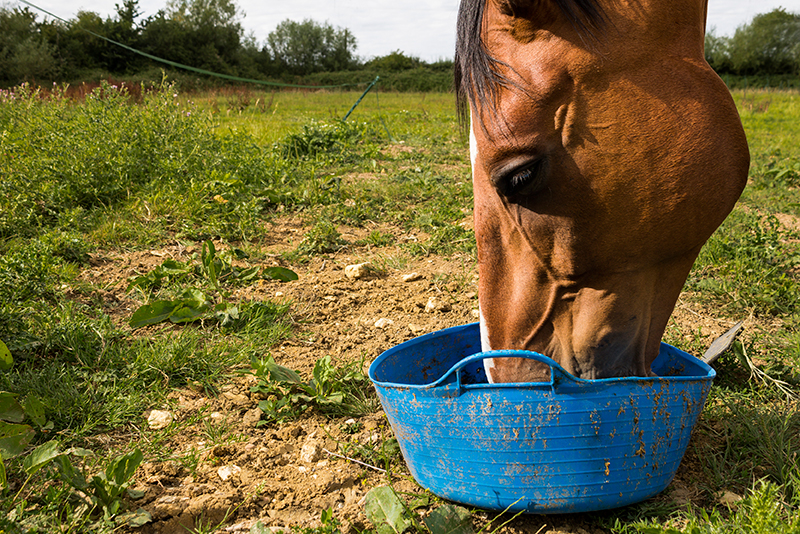
Nutritional supplements are important to horses for a number of reasons, including:
- To fill gaps in the diet: Horses may not get all the nutrients they need from their regular diet, especially if they are working hard, growing, or have a health condition. Nutritional supplements can help to fill these gaps and ensure that the horse is getting all the nutrients it needs.
- To improve performance: Nutritional supplements can help to improve a horse's performance in a number of ways. For example, supplements that contain electrolytes can help to prevent dehydration and muscle cramps in horses that are working hard. Supplements that contain amino acids can help to build muscle and improve recovery time.
- To support overall health and well-being: Nutritional supplements can help to support a horse's overall health and well-being in a number of ways. For example, supplements that contain vitamins and minerals can help to improve the horse's immune system, skin and coat health, and hoof health.
Here are some specific examples of nutritional supplements that may be beneficial for horses:
- Electrolytes: Electrolytes are essential for hydration and muscle function. Horses that are working hard or sweating a lot may need to supplement their electrolyte intake.
- Amino acids: Amino acids are the building blocks of protein. Horses that are working hard, growing, or recovering from an injury may need to supplement their amino acid intake.
- Vitamins and minerals: Vitamins and minerals are essential for a variety of bodily functions. Horses that are not getting a balanced diet may need to supplement their vitamin and mineral intake.
- Joint supplements: Joint supplements can help to support joint health and function in horses of all ages.
- Digestive supplements: Digestive supplements can help to improve digestion and prevent digestive problems in horses.
It is important to note that not all horses need nutritional supplements. Horses that are getting a balanced diet and are in good health may not need any supplements. However, it is always a good idea to talk to your veterinarian about whether or not nutritional supplements may be beneficial for your horse.
If you do decide to give your horse nutritional supplements, be sure to choose a reputable brand and follow the dosage instructions carefully. Overdosing on supplements can be harmful to horses.
Featured Listings - Supplements
 Email: questions@organicanaturals.com
Email: questions@organicanaturals.com


The natural medicine company that's all about science! Support your equine with this full spectrum CBD veterinary formula created specifically for horses large and small. A coconut oil-based CBD carrier allows for easy digestion and the highest bioavailability of Cannabinoids.
Supplements - General Information
Supplements
- Super Joint Solution by Choice of Champions International
- Equine Products Inc.
- 3 Great Wafers by Majesty's Animal Nutrition
- Absorbine
- Advanced Biological Concepts
- AfterAce by Equine Products, LLC
- Air Power™ by Finish Line Horse Products, Inc.
- Anhidrosis Treatment By ONE AC
- Animal Health Solutions Inc.
- BioStar Whole Food Supplements
- Black-As-Knight - Color Enhancement Supplements by Cheval International
- Cheval International
- Chewy
- Choice of Champions International
- Conklin / Fastrack Microbial Pack
- Core Balance
- Cox Veterinary Laboratory, Inc.
- Cur-OST
- DBC Aq Products
- Direct Action Company, Inc.
- Doc's Products, Inc. / OCD Pellets
- Durvet
- E3 Live for Horses
- EGUSIN SLH® and EGUSIN 250® by Centaur Animal Health
- Emerald Valley Natural Health
- EPO-Equine
- EQUI-FORCE™
- Equi-Shine
- Equine Challenge Supplements
- Equine Challenge™ Joint Support
- Equine Chia
- Equine Health Direct
- Equine Medical & Surgical Associates
- Equine Omega Complete
- Equine Performance Products by Oxy-Gen
- Equine Respiratory Products by Equina Wellness™
- Equine Total Gold
- EquiPride and EquiLix by SweetPro
- EquiVision
- Equiwinner
- Evergreen Equine Products
- Farnam
- Figuerola Therapeutic, Sport & Performance Supplements
- Finish Line Horse Products, Inc.
- Five Star Supplement & Feed Products, LLC
- Foran Equine Products
- FORCO® Feed Supplement Digestive Fortifier
- Formula 707
- Foxden Equine
- GastroGard
- Getty Equine Nutrition
- GLC Direct
- Gluquestrian
- Grand Coat™ and Grand Complete™ by Grand Meadows Nutritional Products, Inc.
- Grand Meadows Inc.
- Hawthorne Country Store
- Herbsmith Inc.
- Hilton Herbs, Ltd.
- Hope Equine Products
- Horse Health Products
- Horse Quencher by Equatic Solutions, LLC
- HorseTech
- HorseTech, Inc.
- HorsLic® Supplements
- Jeremiah's Ulcer Repulser
- Joint Fix-It Bev's Equine Products
- Jones Supply
- Kalsytech
- Karbo Combo by Gomer's Inc.
- Kawell, 3045 S Archibald Ave , Ontario, CA
- Kentucky Equine Research (KER)
- Kentucky Performance Products, LLC
- Kombat Boots and Kombat Ready Yeast Pellets
- KV Supply
- La Victoria Performance
- Luitpold Animal Health - Adequan
- Majesty's
- Manna Pro
- Med Vet Pharmaceuticals, Ltd.
- Missing Link Equine (Immunity, Skin & Coat) and Equine Plus TM Joint Support by Designing Health
- Modesto Milling
- MSD Animal Health
- MWI Animal Health
- Northwest Horse Supplement
- Nutramax Laboratories / Cosequin
- Nutri-Plus++ by Equine Products, Inc.
- NuZu Feeds
- O3 Animal Health LLC
- OCD™ Pellets By Doc's Products, Inc.
- Omega Alpha Equine
- Omega Fields
-
Organica Naturals - CBD for Horses

Email: questions@organicanaturals.com


The natural medicine company that's all about science! Support your equine with this full spectrum CBD veterinary formula created specifically for horses large and small. A coconut oil-based CBD carrier allows for easy digestion and the highest bioavailability of Cannabinoids.
- Oxy-Gen
- Oxy-Horse
- Performance Equine Nutrition
- Performance Horse Nutrition
- Platinum Performance
- Power Horse
- Prime Performance Nutrition
- Progressive Earth Equine Nutrition
- ProSportive
- Rainbow Acres, LLC
- Ramard
- Red Cell®
- Redmond Equine
- Resvantage Equine
- Revival Animal Health
- Saratoga Horse RX
- SeaBuck Complete
- Select the Best
- Silver Lining Herbs
- Simply Equine
- Smart Equine - Smart Pak
- Smooth Run Equine
- Springtime Inc.
- Succeed Digestive Conditioning Program
- Superior Horse Nutrition by Stance Equine USA, LLC.
- System Saver Equine
- Tech Mix
- Technyflex Equine
- The Healing Barn
- The Natural Vet
- Tizwhiz Nutrition
- Total Blood Fluids Muscle by Ramard Inc.
- Total Calm and Focus Equine Calming Product by Ramard, Inc.
- Total Equine
- Total Feeds
- Total Joint Care by Ramard, Inc.
- Total Respiratory and Endurance by Ramard, Inc.
- Tribute Equine Nutrition
-
Uckele Health & Nutrition

5600 Silberhorn Hwy, Blissfield, MI 49228
Phone USA:800-248-0330
Email: customerservice@uckele.com


Uckele Health & Nutrition is an innovation-driven manufacturer committed to making people and their animals healthier. On the leading edge of nutritional science and technology for 59 years, Uckele formulates and manufactures a full spectrum of quality nutritional supplements incorporating the latest nutritional advances.
- VetriScience
- VioVet Ltd
- Wellpride Omega-3
- Wholistic Pet Organics
- WILD FORAGE By Norimoor LLC
- Wild Gold Equine Performance Supplements
- Winnie's Organic Horse Cookies
- Zoetis
Supplements - Specialized
Supplements - Anhidrosis Treatment
- Anhidrosis Treatment By ONE AC
- HorseTech
- Superior Horse Nutrition by Stance Equine USA, LLC
- True Sweat by Choice of Champions International
Supplements - AntiOxidents
- Antioxidant Products By Omega Fields
- EndurExtra® by Kentucky Performance Products, LLC
- Equine Omega Complete
- EquiPride and EquiLix by SweetPro
- Hoffman's Horse Minerals
- Karbo Combo by Gomer's Inc.
- Missing Link Equine (Immunity, Skin & Coat) and Equine Plus TM Joint Support by Designing Health
- Neprofin AVF by Southwest Nutraceuticals
- Quality Equine Antioxidants From Med Vet Pharmaceuticals
- SeaBuck Complete
- SOURCE ® “Original” and Pelleted “Original” Micronutrients for Horses
- System Saver Equine
- WILD FORAGE By Norimoor LLC
Supplements - Auto Immune Products
Supplements - Bone Supplements
- Equi-Bone, TLC Animal Nutrition, Inc.
- Equine Joint and Bone Supplements by Evergreen Equine Products
- Hoffman's Horse Minerals
- OCD™ Pellets By Doc's Products, Inc.
Supplements - Breathing Products
- "Guardian Horse Bedding" by Equustock, LLC.
- Air Power™ by Finish Line Horse Products, Inc.
- Breathe Smooth by Smooth Run Equine
- Equine Breathing Supplements by Equine Science
- Equine Immunity Products by Omega Alpha Pharmaceuticals Inc.
- Equine Lung Flush®
- Equine Performance Products by Oxy-Gen
- Equine Respiratory Products by Equina Wellness™
- FLAIR® Nasal Strip
- Lung Aid from Choice of Champions International
- Mike's Original Bleeding Powder, by Equine Products Inc.
- Total Respiratory and Endurance by Ramard, Inc.
Supplements - Calming Treatment
- Chill Ultra™ Paste
- Choice of Champions International
- Equine Performance Products by Oxy-Gen
- Total Calm and Focus Equine Calming Product by Ramard, Inc.
- VetriScience
Supplements - Colic Treatment
- Equine Challenge™ Sand FlushPLUS
- Equine Gut Flush
- Powerful Help For Colicky Horses By TLC Animal Nutrition, Inc.
- Sand Colic Herbal Powder by Equine Science
- SAY WHOA--Stops Colic
- The ASSURE® Product Line by Arenus
Supplements - Dewormers
- Allivet
- IverCare (ivermectin paste) 1.87%
- STRONGID® C 2X
- STRONGID® Paste
- WORM-A-WAY by Cheval International
- ZIMECTERIN
Supplements - Digestive
- Allivet
- Digestive Enzymes by Evergreen Equine Products
- EQUI-FORCE™
- Kent Nutrition Group
- Mad Barn Optimum Digestive Health
- SUCCEED® Digestive Conditioning Program by Freedom Health, LLC
Supplements - Education & Information
Supplements - Electrolytes
- Electrolyte Equine Supplements by Evergreen Equine Products
- Hoffman's Horse Minerals
- Horse Quencher by Equatic Solutions, LLC
- Total Blood Fluids Muscle by Ramard Inc.
Supplements - EPM Prevention
Supplements - Eye Products
Supplements - Fungal Treatment
- "Equine Relief Anti Microbial" by Equine Elite
- Banixx Equine Products by Serborne Corporation
- Coat Defense
- Equiderma by Telesis Animal Health
- Equine Skincare Products by EcoLicious
- Silverquine Gel by Silverquine, LLC
- Topical Major's Solution
Supplements - General
Supplements - Hoof Products
- Allivet
- Farrier's Magic
- Giddyap Girls Biscuit Co.
- Hoof Armor®
- Life Data Labs, Inc.
- N'Dura Hoof
- Nice n’ Shiny Hoof & Body Wash By SBS Equine
- NO THRUSH® by Four Oaks Farm Ventures, Inc
- Quality Hoof Products by Arenus
- Wunder Hoof, By Wunder Hoof, Inc.


































